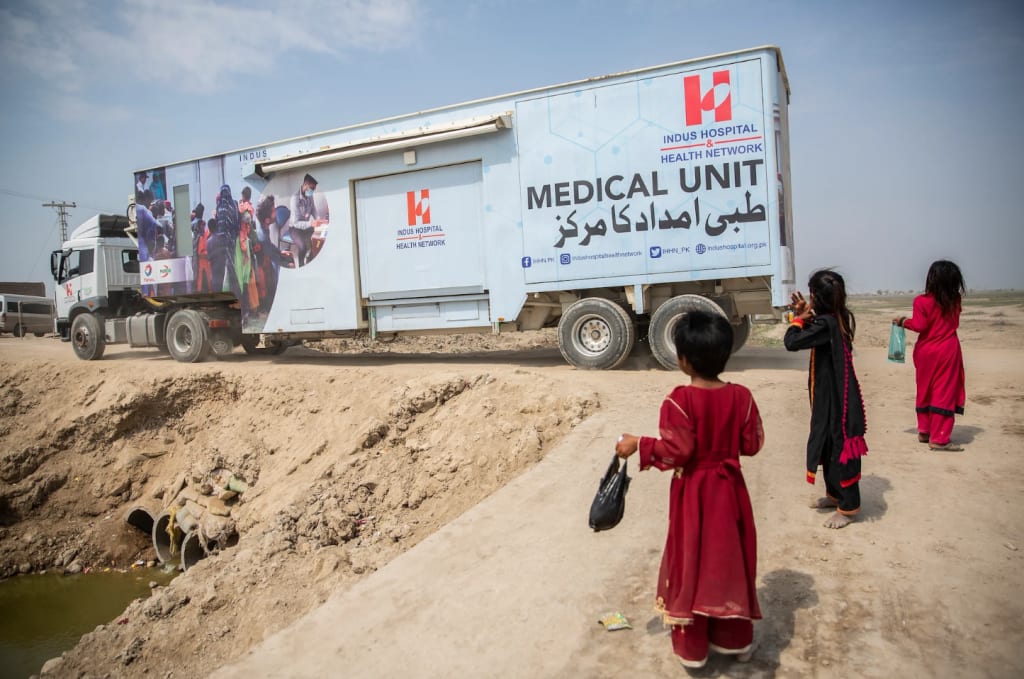For Fazila and millions in Pakistan, climate change brings extreme floods and malaria
It was a very difficult time, it was very hot, there was no running water or toilets," Fazila said. "Everything we had was underwater.

Nothing can stop the flood.
Fazila, a 25-year-old midwife, received a red alert to evacuate her village in Pakistan's Sindh province.
For the next eight days, in the sweltering Pakistani heat, Fazla moved all her belongings to a safe place — a house on a hill that had been kept dry during past monsoon season floods.
Fazila and her mother then fled to safety.
But this flood was different. A few days later, their village was completely flooded, including the house where Fazla carefully stored everything they owned. For the next two weeks, Fazila and her mother lived in tents in a makeshift camp on the bridge.
But this flood was different. A few days later, their village was completely flooded, including the house where Fazla carefully stored everything they owned. For the next two weeks, Fazila and her mother lived in tents in a makeshift camp on the bridge.
“Months have passed and many villages still have (flood) water. People are still living in tents,” Fazila said.
Fazla and her mother found themselves in the same situation, as their house remained unsafe and uninhabitable.
Protecting Others in a Crisis
As Fazila navigates her own crisis, she protects her community.
Fazila is a midwife at the Indus Hospital in Sekhwan, Pakistan. At 16, she saw her aunt die in childbirth and decided to become a doctor to protect other women. Her family couldn't afford medical school, so she became a midwife.
Shortly after returning to his devastated homeland, Fazila started working in a mobile health unit set up by the Indus Hospital and Health Network with support from the Global Fund to Fight AIDS, Tuberculosis and Malaria.
In August, health units were deployed to the communities most affected by the floods to provide vital health services. When the floodwaters were at their highest, Fazila and her colleagues took boats to communities completely cut off by the rising water.
Today, these mobile clinics continue to provide essential health services to communities still recovering from last summer's devastating and unprecedented emergency.
One of Fazila's responsibilities on the mobile medical team was to test and treat people for malaria, as cases began to increase rapidly as the floodwaters rose, a preferred breeding ground for the mosquitoes that spread the disease.
Climate change fueling malaria spread
Climate change is responsible for more intense and more frequent extreme weather events such as storms, droughts, wildfires and floods. It was a severe heat wave, followed by heavier-than-usual monsoon rains and melting Himalayan glaciers, which led to unprecedented floods in Pakistan last year - and then a massive rise in malaria cases.
Fazila said she recalls 50 percent of patients at the mobile clinic testing positive for the disease.
Dr. Mah Talat, executive director of Indian River Hospital and Health Network, recalled that the clouds of mosquitoes were so thick that she and her colleagues could barely see through them. Every person she met who was affected by the floods either had malaria themselves or had a family member with the disease, she said. She said the floods and resulting health crisis were devastating and the emergency was far from over.
"The rains have started again and we are getting reports of an increase in malaria cases as April marks the start of the first of two transmission seasons," she said. "Households and sanitation facilities are still damaged and health workers have yet to Recovery, a large amount of water still pools. We need to act now to ensure this year's monsoon season is not more miserable than last year's.
After the floods, Global Fund investments supported emergency medical camps and mobile clinics, where Fazila and colleagues provided vital health services, including malaria testing and treatment. Support from the Global Fund has also been used to provide clean water, emergency food kits and generators.
Malaria is one of the most climate-sensitive infectious diseases – and climate change is increasing malaria cases and deaths in many parts of the world, often in the poorest and most remote communities.
Today, the Global Fund is supporting ongoing malaria control activities across Pakistan, including community-based malaria testing and treatment, distribution of insecticide-treated nets, indoor residual spraying and education campaigns for communities with the highest disease burden. Investments are also being made to repair and renovate laboratories and clinics that were damaged or destroyed during the floods.
Little by little, Fazla is trying to restore her home and replace items that she and her mother lost.
But she worries about the upcoming monsoon season this summer.
"Floods are going to continue to happen, so we should have plans in place to be better prepared to deal with these difficulties," she said.





Comments
There are no comments for this story
Be the first to respond and start the conversation.